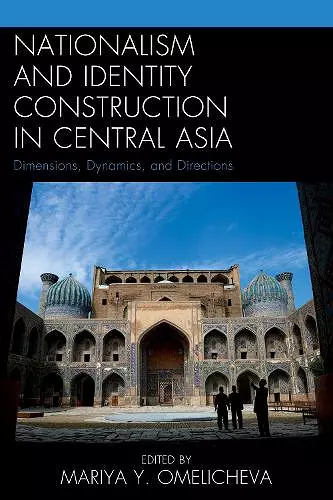Nationalism and Identity Construction in Central Asia
Dimensions, Dynamics, and Directions
Format:Hardback
Publisher:Bloomsbury Publishing PLC
Published:17th Dec '14
Currently unavailable, and unfortunately no date known when it will be back

More than two decades after the break-up of the Soviet Union, Central Asian republics—Kazakhstan, Kyrgyzstan, Tajikistan, Turkmenistan, and Uzbekistan—continue to reexamine and debate whom and what they represent.
Nationalism and Identity Construction in Central Asia explores the complex and controversial process of identity formation in the region using a “3D” framework, which stands for “Dimensions”, “Dynamics,” and “Directions” of nation building. The first part of the framework—dimensions—underscores the new and complex ways in which nationalisms and identities manifest themselves in Central Asia. The second part—dynamics—is premised on the idea that nationalisms and identity construction in the Central Asian republics may indicate some continuities with the past, but are more concerned with legitimation of the present power politics in these states. It calls for the identification of the main actors, strategies, tactics, interests, and reactions to the processes of nationalism and identity construction. The third part of the framework—directions—addresses implications of nationalisms and identity construction in Central Asia for regional and international peace and cooperation.
Jointly, the chapters of the volume address domestic and international-level dimensions, dynamics, and directions of identity formation in Central Asia. What unites these works is their shared modern and post-modern understanding of nations, nationalisms, and identities as discursive, strategic, and tactical formations. They are viewed as “constructed” and “imagined” and therefore continuously changing, but also fragmented and contested.
The volume begins with a useful outline of theoretical debates on nationalism and identity formation, focused on Central Asia, and at the same time provides insights into relevant legacies and current challenges. It is followed by six case studies exploring different aspects of nationalism and identity building…. The author implicitly acknowledges the contemporary identities promoted by political elites as colonial legacies and finds conflict solutions in pre-Soviet identities of the ‘Central Asian civilisation’ that derive from families and regions, and are by its multi-ethnic approach more inclusive. Overall, the volume provides interesting (and also innovative) insights into identity formation in the Central Asian countries…. All contributions explore the field top-down from a macro- or meso-level analysis. * Europe-Asia Studies *
Ukraine’s violent clashes remind us (as if we needed it) that ethnicity, language, and nationalism are powerful identity markers in the post-Soviet space. In Nationalism and Identity Construction in Central Asia, Mariya Omelicheva has assembled a talented group of senior and junior scholars who explain how Central Asia’s authoritarian leaders and social entrepreneurs are using history, symbolism, religious beliefs, modern public relations tools, and distant national traumas to shape identities. Students of Central Asian politics, and of nationalism and identity politics more broadly, should welcome this timely and important study. -- Charles E. Ziegler, University of Louisville
Mariya Omelicheva has gathered an exceptional group of contributors in Nationalism and Identity Construction in Central Asia to explore the evolution of identity politics in the region. Using a variety of approaches, the author looks at past, present, and potential future definitions of national identity in Central Asia. The editor frames the questions in a way that will make this volume important for both area specialists and scholars interested in the broader questions related to how we perceive ourselves and others around us. -- Roger D. Kangas, National Defense University
More than twenty years after the USSR's collapse, the politics of identity and nationalism continue to define post-Soviet Central Asia. This welcome volume will find an eager readership among students and scholars of the region. -- Edward Schatz, University of Toronto
ISBN: 9780739181348
Dimensions: 240mm x 160mm x 19mm
Weight: 426g
198 pages